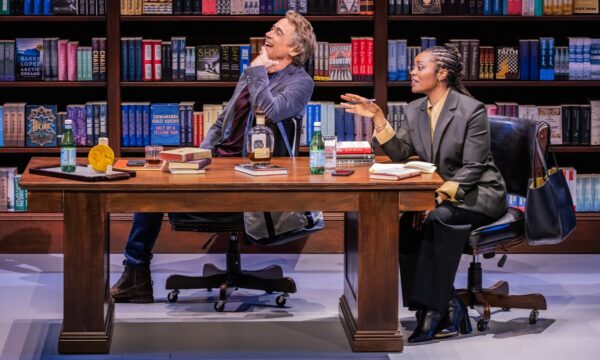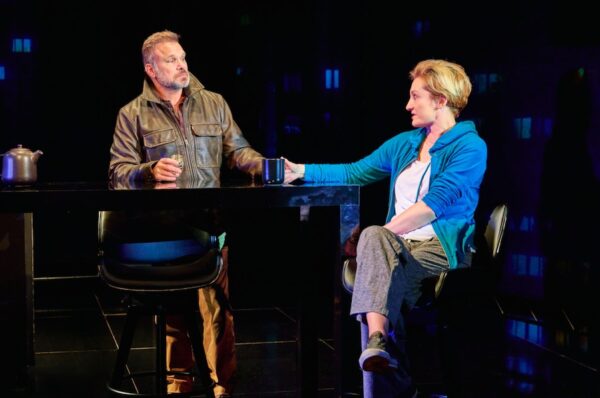Two new productions on and Off-Broadway feature a major male star best known for his work in media other than theater playing a world-renowned celebrity struggling with the forces of overwhelming fame, a rotting popular culture and his own colossal ego. Both leading men deliver credible performances, and both plays attempt to address serious issues of media-mad society. One fails to live up to its noble intentions, while the other succeeds in presenting a complex, humorous and thought-provoking evening. The former is Ayad Akhtar’s McNeal starring Oscar winner Robert Downey Jr. at Lincoln Center’s cavernous Vivian Beaumont. The latter is Kenneth Lonergan’s Hold On to Me Darling with Oscar nominee Adam Driver at the more intimate Lucille Lortel.

Credit: Matthew Murphy and Evan Zimmerman
McNeal certainly looks impressive in Barlett Sher’s dazzling, special-effects-laden production. Akhtar’s script deals with a narcissistic, Nobel Prize-winning novelist facing his own mortality and the encroaching dangers of artificial intelligence. Sher stuns us with a sleek, futuristic staging. The time is “the very near future” when three of the top volumes on the NY Times best-seller list are authored by AI. The cool, sterile sets by Michael Yeargan and Jake Barton, the eye-popping projections by Barton, and the impressive lighting by Donald Holder create a sci-fi, video-game universe fit for a Hollywood blockbuster. But the self-indulgent plot seems like an AI-generated melodrama extrapolated from the introspective works of Philip Roth.
After receiving a dire diagnosis from his stern doctor (solid Ruthie Ann Miles) to cut down the booze, winning that Nobel, and preparing for his latest work to be published, McNeal battles with his estranged son (overzealous Rafi Gavron), worried agent (brilliant Andrea Martin), and former lover (weepy Melora Hardin). Trouble is the explosive McNeal may have plagiarized the piece from his late wife (dead by suicide) and from the pervasive demons of AI.
Akhtar does have some interesting and cogent arguments about AI and several other troubling trends in our screen-obsessed world. These are expressed in the sole gripping scene of the play—between McNeal and an antagonistic African-American woman journalist (a strong Brittany Bellizeare). Harvey Weinstein, Ronald Reagan, the Me Too movement, the dumbing-down of America and McNeal’s creed of truth above everything all figure in this stimulating exchange.
Too bad it’s like an island of sane discourse is a sea of melodrama. Downey, Jr. exhibits his trademark bad-boy charm as the explosive author, but even he can’t make us care about the basically obnoxious author. Andrea Martin rescues her scenes with split-second timing and subtext-laden silent reactions. She turns a rapid telephone exchange with a stubborn publisher into a lesson in comedy. The remainder of the cast which also includes Saisha Talwar as the agent’s eager assistant, do their level best to bring life to this derivative and flashy play, but McNeal is a hollow retread of Roth’s washed-up, self-hating protagonist trope.

Credit: Julieta Cervantes
While McNeal attempts to analyze dangerous trends in our culture, Hold On to Me Darling actually does so through the lens of its hapless, filthy rich hero. Originally presented at the Atlantic Theater Company in 2016, Darling focuses on self-centered country-western superstar Strings McCrane, struggling to find happiness in the aftermath of his censorious mother’s death. Kenneth Lonergan’s nearly three-hour comedy-drama never drags in Neil Pepe’s solid-steel production (Pepe also directed the previous Atlantic staging). Adam Driver manages to make Strings sympathetic even though the character is constantly making impulsive decisions and leaving emotional wreckage in his glamorous wake. Speaking in country-western cliches, Strings is all id, driven by his immediate needs, regardless of the consequences.
Lonergan skillfully satirizes America’s glittering but empty celebrity culture as well as our national tendency to avoid moral responsibility as exemplified by Strings’ reckless behavior. Driver is simultaneously charismatic and pathetic, believably creating a star who could headline stadium concerts and Hollywood sci-fi epics. He’s not bad at singing or playing the guitar either. It’s understandable why people would be drawn to him, in spite of Strings’ erratic nature.
Keith Nobbs’ needy assistant Jimmy, CJ Wilson’s down-to-earth brother Duke, and Adelaide Clemens’s innocent cousin Essie (all veterans of the 2016 production) and Heather Burns’ scheming girlfriend Nancy, all contribute layered and complex performances, each delivering their characters’ multiple motives. Though he only appears for a few minutes at the end of the play, Frank Wood has a devastating impact and unlocks Strings’ neuroses. Walt Spangler’s detailed, versatile set create a believable world of hotel rooms, feed stores and small-town dens in this penetrating and funny play from one of our most insightful dramatists.

Manhattan Theater Club offers another piercing drama on an Off-Broadway stage at City Center’s Stage I. Erika Sheffer’s Vladimir may evoke comparisons to last season’s Patriots, Peter Morgan’s harrowing drama of the rise of Russian dictator Vladimir Putin and the downfall of oligarch Boris Berezovsky. But, unlike Morgan’s piercing portrait of Russian power struggles, Sheffer keeps Putin off-stage and makes her title character a menacing, unseen monster. Like Patriots, Vladimir includes Boris Yelstin’s famous 1999 resignation as Russia’s president in favor of Putin who bathes his country in corruption and launches distracting wars.
The focus of Sheffer’s script is on independent journalists Kostya (ribald and conflicted Norbert Leo Butz) and Raya (steely and striking Francesca Faridany), and on timid bookkeeper Yevgeny (sympathetic and moving David Rosenberg) who takes a surprisingly bold stand against Putin’s rotten regime. The action takes place mostly during 2004 right after the title character has been voted in for another term in a sham election. Kostya and Raya find their voices crushed and their lives threatened as the Russian state hurtles towards autocracy. Sheffer powerfully depicts the slow, incremental acceptance of Putin’s terroristic regime, directed with an adept hand by Daniel Sullivan. The parallels between Putin and Trump are subtle but unmistakable, as are the demonization of the Chechens with that of the Palestinians.
In addition to the sterling Butz, Faridany and Rosenberg, Erin Drake, Erik Jensen, Olivia Deren Nikkanen and Jonathan Walker offer sturdy support in multiple roles. Mark Wendland’s flexible set suggests a TV studio where Putin deceives his public with manufactured news, a striking metaphor for a dangerous administration and a warning for us Americans.
McNeal: Sept. 30—Nov. 24. Lincoln Center Theater at the Vivian Beaumont Theater, 150 W. 65th St., NYC. Running time: one hour and 45 mins. with no intermission. lct.org
Hold On to Me Darling: Oct. 16—Dec. 22. Lucille Lortel Theatre, 121 Christopher St., NYC. Running time: two hours and 45 mins. including intermission. holdontomedarling.com
Vladimir: Oct. 15—Nov. 10. Manhattan Theater Club at City Center Stage I, 131 W. 55th St., NYC. Running time: two hours and 30 mins. including intermission. nycitycenter.org
